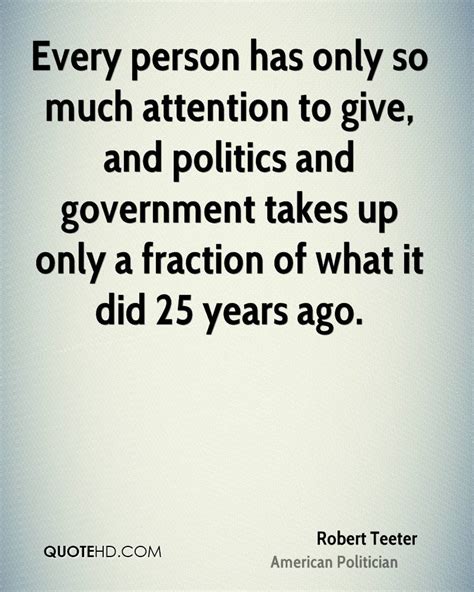A Quote by William Julius Wilson
If you're not working, over time you're much more likely to develop attitudes and orientations and behavior patterns that are associated with casual or infrequent work. And then when you open up opportunities for people, you notice that these attitudes, orientations, habits and styles also change.
Related Quotes
Change is difficult and it takes time. It is hard for people to change their own behavior, much less that of others. Change programs normally address attitudes, ideas, and rewards. But the behaviors of people in organizations are also strongly shaped by habits, routines, and social norms. Real change requires new power relationships, new work routines and new habits, not just intent.
Does character develop over time? In novels, of course it does: otherwise there wouldn't be much of a story. But in life? I sometimes wonder. Our attitudes and opinions change, we develop new habits and eccentricities; but that's something different, more like decoration. Perhaps character resembles intelligence, except that character peaks a little later: between twenty and thirty, say. And after that, we're just stuck with what we've got. We're on our own. If so, that would explain a lot of lives, wouldn't it? And also - if this isn't too grand a word - our tragedy.
Creative power has to filter through our beliefs, attitudes, emotions, and habits. The more negative and constricted our beliefs and patterns are, the more they block the creative energy. Most people hope that by ignoring negativity, it will go away, but the reverse is actually true. Through recognizing, acknowledging, and experiencing it, the blocked energy can be released. You are then free to replace it with positive beliefs and attitudes.
Worker-owned co-ops, on their own, floating in the market, tend to replicate the behavior of worker-owned capitalists in some circumstances. They sometimes develop positive participatory schemes, sometimes not. We know from the studies of worker-owned plywood companies in the US, they can tend to develop conservative attitudes, not socialist attitudes. So even though I'm an advocate of further democratization of the workplace, we also need to be building larger structures.
As patterns of obedience develop, the specific blessings associated with obedience are realized and belief emerges. Desire, hope, and belief are forms of faith, but faith as a principle of power comes from a consistent pattern of obedient behavior and attitudes. Personal righteousness is a choice. Faith is a gift from God, and one possessed of it can receive enormous spiritual power.
Marketers use big data profiling to predict who is about to get pregnant, who is likely to buy a new car, and who is about to change sexual orientations. That's how they know what ads to send to whom. The NSA, meanwhile, wants to know who is likely to commit an act of terrorism - and for this, they need us.
I like aristocracy. I like the beauty of aristocracy. I like the hierarchical feeling.You could claim that it's due to my military experience. But it came before that. I love their freedom of behavior. They're not constrained by penal attitudes, puritanical attitudes about behavior, both socially and morally. They have a freedom that I admire. An unquestioned freedom.






































